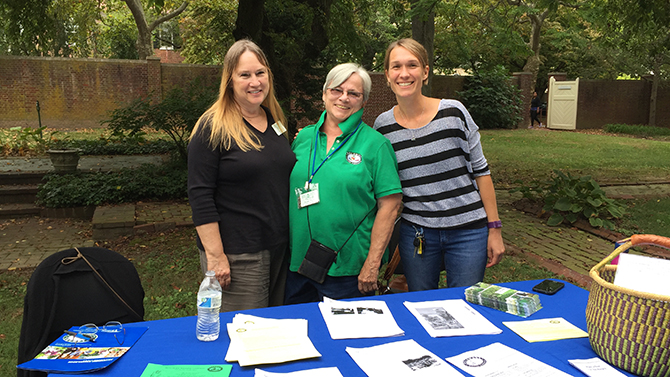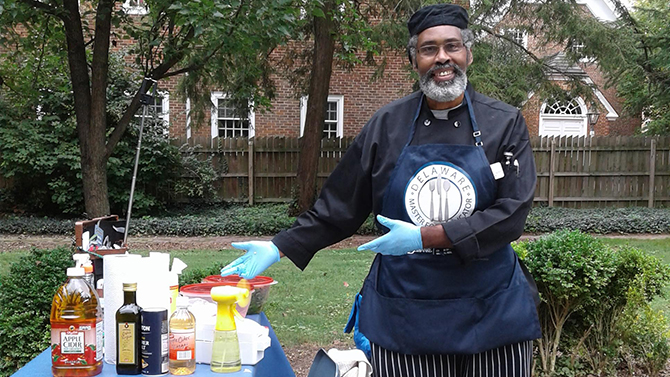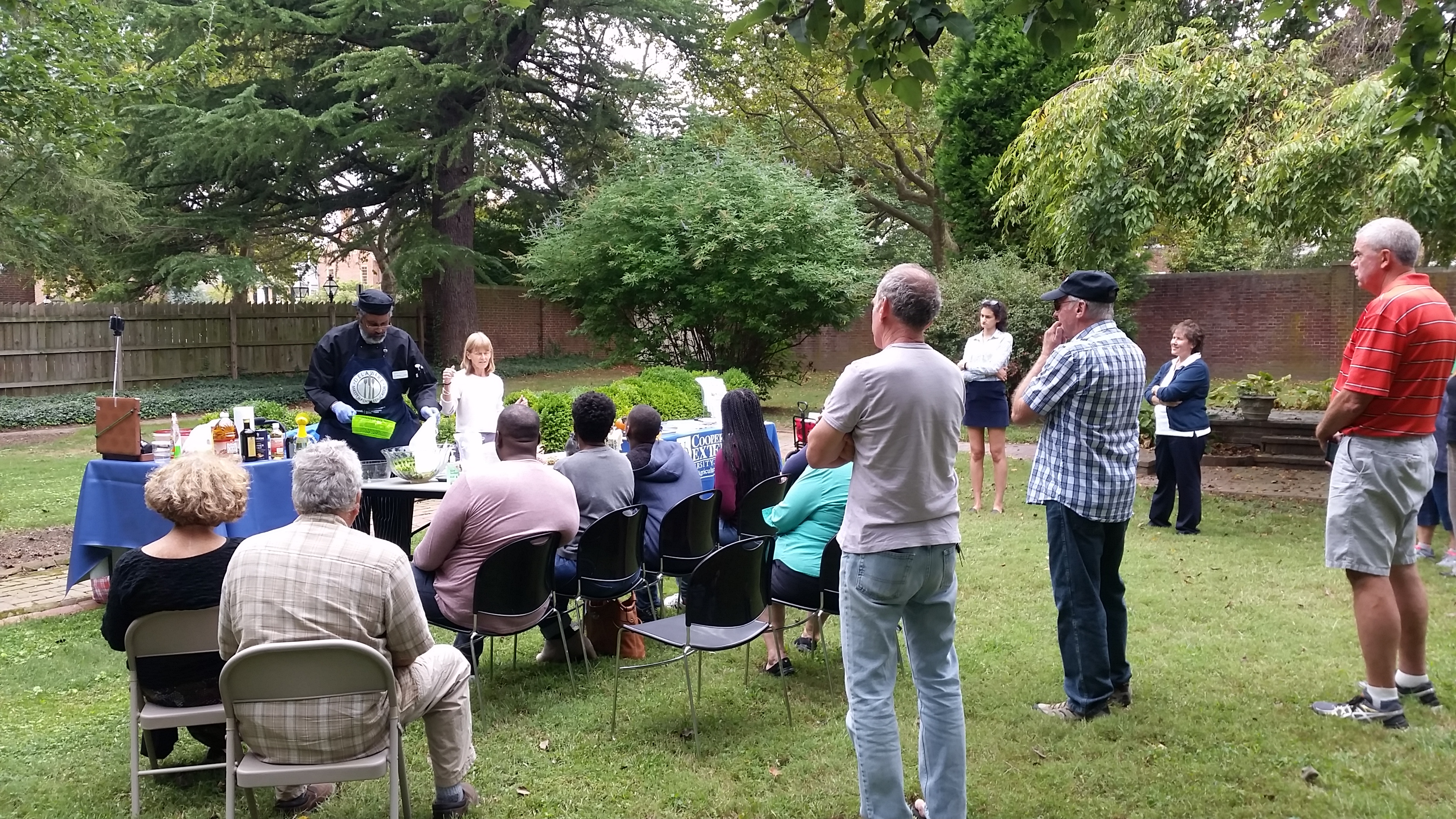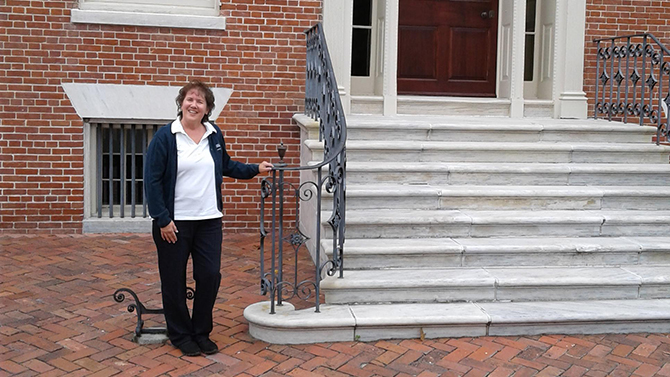

Farm 2 Fork
October 21, 2016
Cooperative Extension visits Read House for a taste of the past
With a focus on 18th century foods and preservation, the second annual Farm 2 Fork event was held Sept. 24 at the historic Read House and Gardens in New Castle, Delaware.
Cheryl Bush, UD Cooperative Extension educator and registered dietician in Family and Consumer Sciences, and Carrie Murphy, UD Extension Master Gardener coordinator and horticultural educator, were invited to participate by Katie McDade, head of Read House and Gardens and public programming with the Delaware Historical Society.
Farm 2 Fork event occurred on the same day as Smithsonian’s Museum Day Live!, in which multiple museums and cultural institutions across the country participated. More than 200,000 Museum Day tickets total were downloaded from Smithsonian’s website for this nationwide celebration.
Sally Reiss and Michael Hadley, both Master Food Educators, provided an in-depth and historically relevant demonstration on food preservation and preparation. The presentation took visitors back to the 1700s, offering a look at what food was grown, how it was preserved, and what was consumed.
Hadley, a personal chef, provided a demonstration on how to prepare autumn chopped apple salad, served in clear cups with red forks to complement the fall-themed recipe, which was created by Gail Hermenau, a Master Gardener and Master Food Educator.
Reiss said she found that many of Delaware’s earliest food and recipes were drawn from German and English influences, as many Germans initially settled in Pennsylvania and northern Delaware. Broiled chicken with sour-milk biscuits was a staple, and steamed crabs were a seafood favorite in the summer.
Some examples of popular recipes from the time include apple fritters, “sweet-meat” pudding, and potato soup.
The people of the 17th and 18th centuries did not have the modern technology of refrigeration, so other methods of preservation had to be used, including underground cellars packed with straw, salting, and pickling. Meat had to be consumed or preserved within 24 hours to prevent spoiling.
McDade said she believes the Farm 2 Fork event was very important and beneficial in helping the public understand history. “To know where we’re going, we have to know where we’ve come from,” she said. “To understand the community that we’re a part of, our sense of our identity, how we fit into our communities, and how we move forward, we need to know our past.”
In support of the project, Lori Ennis, Kent County Master Gardener and former John Dickinson Plantation interpreter, provided the Cooperative Extension with invaluable information about crops used from the time period. “John Dickinson and George Read were actually very close friends and it was very common practice to send plants back and forth among friends,” said Ennis, who added that common crops grown included cabbage, garden cress, carrots, turnips, radish, leeks, pumpkin and onion, just to name a few.
“It was a great opportunity get families to come out and see the garden, because the garden doesn’t typically get much public exposure through specific programming,” said McDade.
Also at the event, Murphy and Master Gardener volunteers Karen Curtis and Lynne Perry provided information on gardening at home. Murphy and the Master Gardeners discussed food-oriented gardening, provided soil test kits and information, and offered literature on vegetable gardening, backyard composting and pest management.
“Gardening know-how isn’t intuitive for most” Murphy said. “Many people make simple mistakes because they just never knew any different. Someone might buy a plant for the aesthetic look without understanding its needs. And many people inherit their landscapes with their homes so sometimes people don’t know where to start. Our goal is to help educate people on gardening, which can be intimidating sometimes.”
The event proved to be a huge success and plans are in the making for the third annual Farm 2 Fork next year. “I’m really excited and pleased to have worked with the UD Cooperative Extension. Hopefully this is a sign of more to come. Next year perhaps we can collaborate with some more partners and make it a more coordinated effort, as well as a larger event,” said McDade.
Those with interest in becoming Master Food Educators can contact Bush at cbush@udel.edu and those with interest in becoming Master Gardeners can contact Murphy at cjmurphy@udel.edu or 302-831-COOP.
Contact Us
Have a UDaily story idea?
Contact us at ocm@udel.edu
Members of the press
Contact us at 302-831-NEWS or visit the Media Relations website





